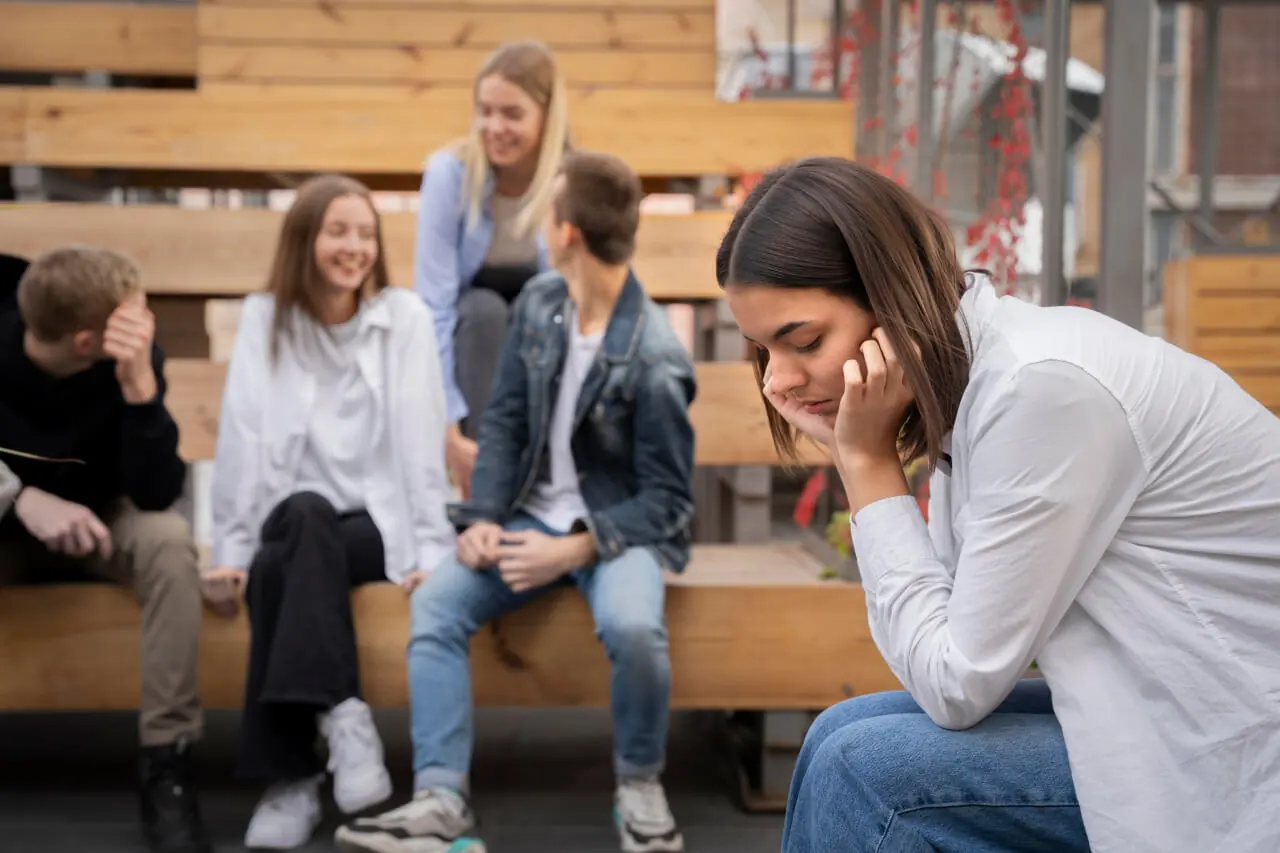Social Anxiety is a common and distressing condition that affects millions of people around the world.
It is characterized by intense fear and nervousness in social situations, such as meeting new people, speaking in public, or being the center of attention.
People with social anxiety often worry about being judged, rejected, or humiliated by others, and may avoid or endure social situations with extreme discomfort.
Social anxiety can interfere with daily activities, relationships, work, school, and overall well-being.
If you struggle with social anxiety, you may feel like there is no way out of your fear and anxiety.
However, the good news is that social anxiety is treatable and you can learn to overcome it with some powerful strategies and techniques.
In this article, we will explore what causes social anxiety, what are its symptoms, how to transform negative thoughts, and what are some effective strategies to overcome social anxiety and build social confidence.
We will also discuss how to find community support and adopt healthy lifestyle habits for improved mental well-being.
Understanding Social Anxiety
Social anxiety is more than just shyness or nervousness.
It is a persistent and excessive fear of social situations that involves being exposed to the possible scrutiny or evaluation of others.
People with social anxiety disorder, also known as social phobia, may experience symptoms such as:
- Fear of situations in which they may be judged negatively.
- Worry about embarrassing or humiliating themselves.
- Intense fear of interacting or talking with strangers.
- Fear that others will notice that they look anxious.
- Fear of physical symptoms that may cause them embarrassment, such as blushing, sweating, trembling, or having a shaky voice.
- Avoidance of doing things or speaking to people out of fear of embarrassment.
- Avoidance of situations where they might be the center of attention.
- Anxiety in anticipation of a feared activity or event.
- Intense fear or anxiety during social situations.
- Analysis of their performance and identification of flaws in their interactions after a social situation.
- Expectation of the worst possible consequences from a negative experience during a social situation.
For children, social anxiety may also manifest as crying, having temper tantrums, clinging to parents, or refusing to speak in social situations.
Social anxiety disorder typically begins in the early to mid-teens, though it can sometimes start in younger children or in adults.
It is estimated that about 7% of the U.S. population suffers from social anxiety disorder in any given year, and about 12% of the population will experience it at some point in their lives.
Social anxiety disorder is slightly more common among females than males, and among people who have a family history of anxiety disorders.
Causes of Social Anxiety
The exact causes of social anxiety are not fully understood, but researchers believe that it is a result of a combination of biological, psychological, and environmental factors.
Some of the possible causes of social anxiety include:
Genetics: Some people may inherit a tendency to be more anxious or sensitive to stress, which may make them more prone to developing social anxiety.
Studies have shown that social anxiety disorder runs in families and that it is influenced by genetic factors.
Brain structure and function: Some people may have differences in the structure and function of certain brain regions that are involved in regulating emotions, fear, and anxiety.
For example, people with social anxiety disorder may have an overactive amygdala, which is the part of the brain that detects and responds to threats
Temperament: Some people may have a personality trait that makes them more shy, introverted, or inhibited, which may increase their risk of developing social anxiety.
People with this trait may be more easily overwhelmed by new or unfamiliar situations, and may have difficulty expressing themselves or coping with negative emotions5.
Negative experiences: Some people may develop social anxiety as a result of having negative or traumatic experiences in social situations, such as being bullied, teased, rejected, criticized, or humiliated.
These experiences may cause them to develop a negative self-image and a fear of being judged by others.
Learned behavior: Some people may learn to be socially anxious from observing or modeling the behavior of others, such as their parents, siblings, or peers. For example, if a parent is overly anxious or protective in social situations, a child may learn to be fearful or avoidant of social situations as well.
Symptoms of Social Anxiety
Social anxiety can cause various symptoms that affect a person’s emotional, behavioral, and physical well-being.
Some of the common symptoms of social anxiety include:
Emotional symptoms: These include feelings of fear, nervousness, anxiety, panic, embarrassment, shame, guilt, or self-consciousness in social situations.
People with social anxiety may also experience low self-esteem, negative self-talk, depression, or suicidal thoughts.
Behavioral symptoms: These include avoiding or escaping from social situations that cause anxiety, or enduring them with extreme distress.
People with social anxiety may also have difficulty making or keeping friends, maintaining eye contact, speaking clearly, or expressing themselves.
They may also use alcohol or drugs to cope with their anxiety or to reduce their inhibitions.
Physical symptoms: These include physical reactions that are triggered by the body’s stress response, such as blushing, sweating, trembling, shaking, stuttering, nausea, vomiting, diarrhea, dizziness, fainting, muscle tension, or feeling like their mind is going blank.
These symptoms can vary in severity and frequency, depending on the person and the situation.
Some people may only experience social anxiety in specific situations, such as giving a speech, eating in public, or dating, while others may experience it in a variety of social situations.
Some people may have mild or moderate social anxiety that causes them some discomfort but does not interfere with their daily functioning, while others may have severe or generalized social anxiety that causes them significant distress and impairment in their personal, academic, or professional lives.
How to Transfer Negative Thoughts
One of the key factors that contributes to social anxiety is the way a person thinks about themselves and others in social situations.
People with social anxiety tend to have negative and distorted thoughts that fuel their fear and anxiety.
Some of the common types of negative thoughts that people with social anxiety have include:
Mind reading: This is when a person assumes that they know what others are thinking or feeling about them, without any evidence or confirmation. For example, “They must think I’m stupid and boring.”
Fortune telling: This is when a person predicts that something bad will happen in the future, without any evidence or reason. For example, “I will mess up my presentation and everyone will laugh at me.”
Catastrophizing: This is when a person exaggerates the negative consequences of a situation or event, and ignores the positive or neutral aspects. For example, “If I say something wrong, I will ruin my reputation and lose all my friends.”
Personalizing: is the tendency to blame yourself for everything that goes wrong or to think that it is only you who has a problem.
For example, you might think that you are the only one who feels nervous in social situations, or that everyone is judging you harshly.
Personalizing can make you feel isolated and hopeless, and prevent you from seeking help or support.
By challenging and changing your negative thoughts, you can reduce the impact of personalizing and improve your self-esteem and confidence. You can also use cognitive behavioral therapy (CBT) techniques, such as thought records, to help you with this.
5 Strategies to Overcome Social Anxiety
Now that you have a better understanding of what social anxiety is, what causes it, and how to transform your negative thoughts, you might be wondering what you can do to overcome it in practice.
Here are Four strategies that can help you cope with social anxiety and improve your social skills:
1. Face your Fears:
The most effective way to overcome social anxiety is to gradually expose yourself to the situations that make you anxious, and learn to cope with them.
This is called exposure therapy, and it can help you reduce your fear and anxiety over time. Exposure therapy can be done with the help of a therapist, or on your own, depending on your level of anxiety and comfort.
The key is to start with situations that are mildly or moderately challenging, and work your way up to more difficult ones. For example, you can start by making eye contact with strangers, then move on to saying hello, then having a small talk, and so on.
The more you practice, the more confident and comfortable you will become.
2. Use relaxation techniques: Another way to cope with social anxiety is to use relaxation techniques, such as deep breathing, progressive muscle relaxation, or mindfulness meditation, to calm your body and mind.
Relaxation techniques can help you lower your stress levels, reduce your physical symptoms of anxiety, and increase your focus and concentration.
You can use relaxation techniques before, during, or after a social situation, depending on your needs and preferences.
For example, you can take a few deep breaths before entering a room full of people, or do a body scan meditation after a stressful conversation.
3. Challenge your negative self-talk:
As we discussed earlier, one of the main causes of social anxiety is negative self-talk, or the way you talk to yourself in your head.
Negative self-talk can make you feel insecure, inadequate, and hopeless, and affect your behavior and performance in social situations.
To overcome this, you need to challenge your negative self-talk, and replace it with more positive and realistic ones.
For example, instead of thinking “I’m going to fail this interview”, you can think “I have prepared well for this interview, and I have the skills and qualifications they are looking for”.
By changing your self-talk, you can change your attitude and outlook, and boost your confidence and motivation.
4. Improve your communication skills:
Another factor that can contribute to social anxiety is poor communication skills, or the lack of ability to express yourself clearly, effectively, and appropriately in social situations.
Poor communication skills can make you feel nervous, misunderstood, or rejected, and prevent you from forming meaningful relationships with others.
To improve your communication skills, you need to practice them regularly, and learn from your feedback and experience.
Some of the communication skills that can help you overcome social anxiety are:
Active listening: Active listening is the skill of paying attention to what the other person is saying, and showing interest and empathy.
Active listening can help you understand the other person better, and make them feel valued and respected.
To practice active listening, you can use techniques such as nodding, smiling, asking questions, paraphrasing, or summarizing what the other person said.
Assertiveness: Assertiveness is the skill of expressing your thoughts, feelings, and needs in a respectful and confident way, without being aggressive or passive.
Assertiveness can help you stand up for yourself, set boundaries, and negotiate effectively.
To practice assertiveness, you can use techniques such as using “I” statements, being clear and specific, saying “no” when necessary, or offering alternatives or compromises.
Nonverbal communication: Nonverbal communication is the skill of using your body language, facial expressions, eye contact, gestures, and tone of voice to convey your message and emotions.
Nonverbal communication can help you enhance your verbal communication, and create a positive and friendly impression.
To practice nonverbal communication, you can use techniques such as maintaining eye contact, smiling, using open and relaxed postures, or matching your tone and volume to the situation.
Seek social support: The last strategy to overcome social anxiety is to seek social support, or the help and encouragement of others who care about you.
Social support can help you cope with stress, anxiety, and loneliness, and provide you with a sense of belonging and acceptance.
Social support can come from various sources, such as your family, friends, colleagues, classmates, or online communities.
To seek social support, you can:
- Reach out to someone you trust, and share your feelings and thoughts with them.
- You might be surprised to find out that they have similar experiences or challenges, or that they can offer you some advice or comfort.
- Join a group or club that shares your interests, hobbies, or goals.
- You can find groups or clubs online or offline, depending on your preference and availability.
- You can also join a support group or a therapy group for people with social anxiety, where you can learn from others and practice your social skills in a safe and supportive environment.
- Volunteer for a cause that you care about, or help someone in need.
- Volunteering can help you connect with others who share your values and passions, and give you a sense of purpose and fulfillment.
- Volunteering can also help you develop new skills, gain new experiences, and expand your network.
Conclusion
Social anxiety is a common and treatable condition that can affect your quality of life and well-being.
However, you can overcome social anxiety by following the strategies and techniques that we discussed in this article, such as understanding social anxiety, transforming negative thoughts, facing your fears, using relaxation techniques, challenging your negative self-talk, improving your communication skills, seeking social support, and adopting healthy lifestyle habits.
By doing so, you can improve your mental well-being, and enjoy social situations with confidence and ease.
Remember, you are not alone, and you can overcome social anxiety today.
FAQs
How common is social anxiety?
Social anxiety is prevalent, affecting millions worldwide. It ranges from mild shyness to severe anxiety, impacting people of all ages.
Can social anxiety be self-treated?
Yes, many individuals successfully manage social anxiety on their own using various strategies.
However, seeking professional guidance is recommended for severe cases.
How long does it take to see results with these strategies?
Results vary, but consistent practice of the strategies can lead to noticeable improvements over time. Patience and persistence are key.
Are these strategies suitable for all age groups?
Yes, the outlined strategies are applicable to individuals of all ages.
Tailor them to suit personal preferences and comfort levels.
Can social anxiety be completely overcome?
While complete elimination may not be realistic for everyone, significant improvement is achievable. Managing social anxiety involves ongoing effort and self-awareness.
Should I disclose my social anxiety to others?
It’s a personal choice. Sharing with trusted friends or colleagues can foster understanding and support, but decide based on your comfort and the nature of relationships.





